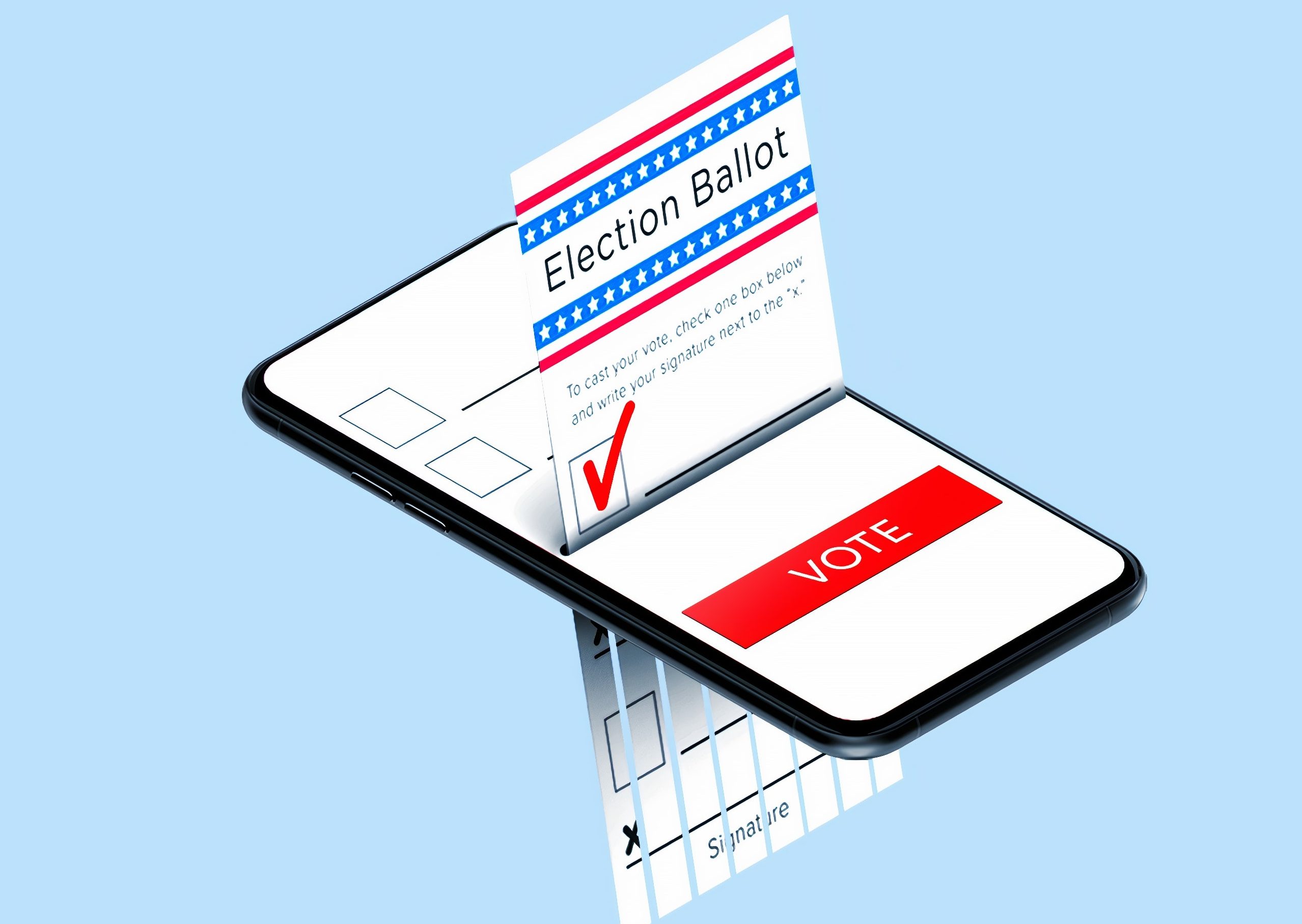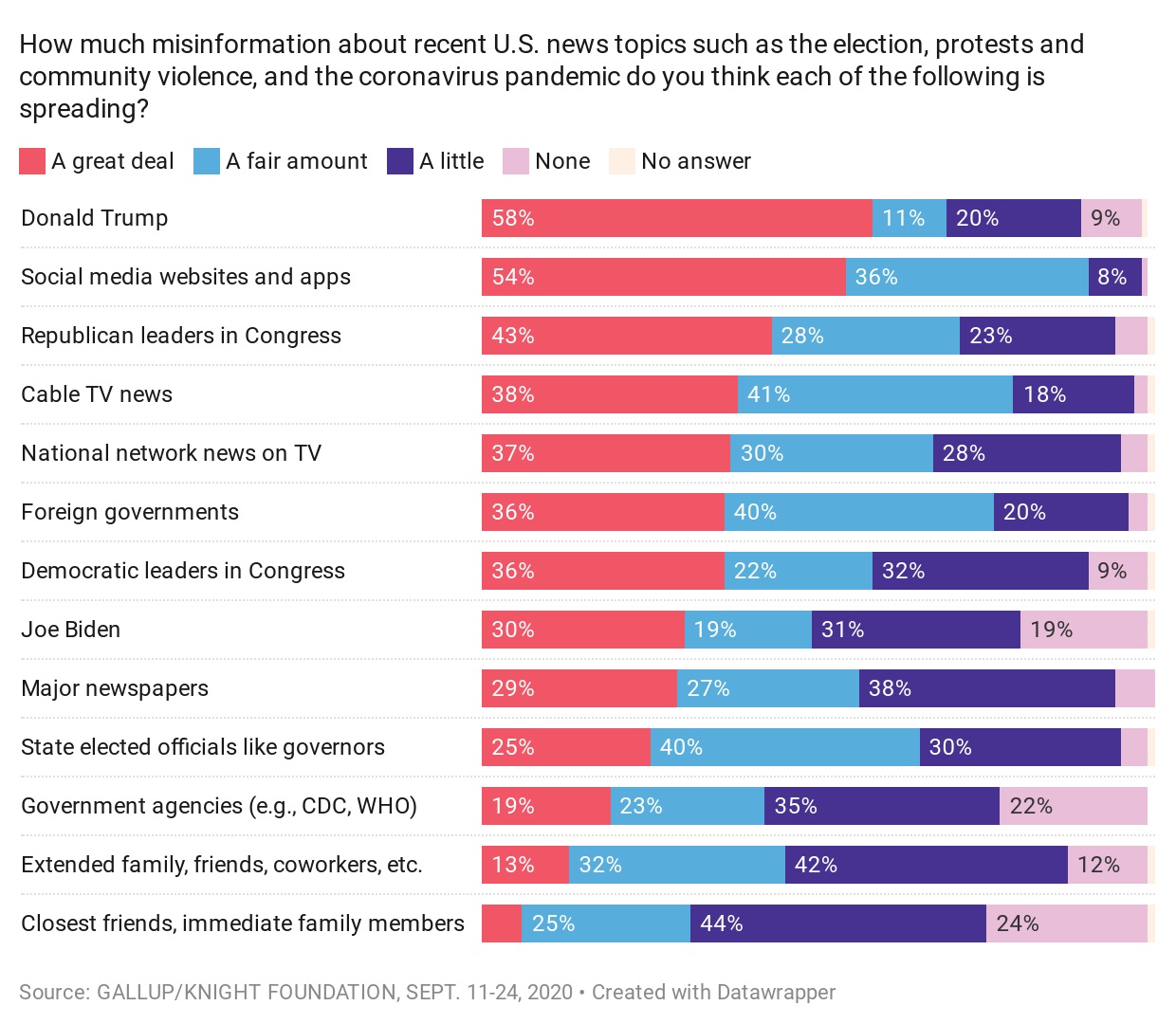
Four in five Americans concerned misinformation will influence election
As the nation prepares to go to the polls in less than a month, Americans are widely concerned that misinformation on social media will sway the 2020 election outcome. Majorities of Americans say President Donald Trump and social media websites and apps are spreading a great deal of misinformation.
This new Gallup/Knight Foundation study exploring misinformation and its effects is part of the Trust, Media and Democracy series. The probability-based web survey was conducted Sept. 11-24, prior to the first presidential debate and President Donald Trump’s COVID-19 diagnosis.
How concerned is the public?
Four in five Americans are concerned — either very (48%) or somewhat (33%) — that misinformation on social media will sway the outcome of the 2020 presidential election. The level of concern expressed by partisan groups differs considerably, with 62% of Democrats very concerned about misinformation and its effect on the election, compared with 36% of Republicans and 40% of independents. However, majorities of Republicans and independents are at least somewhat concerned.
Who are viewed as the greatest spreaders of misinformation?
Of 13 potential sources, just two — President Donald Trump and social media — are deemed by a majority of Americans to be spreading a great deal of misinformation about recent U.S. events, including the election, protests and community violence, and the coronavirus.
- Nearly 6 in 10 (58%) think Trump is disseminating a great deal of misinformation, 11% a fair amount
- 54% say social media is responsible for a great deal of misinformation, 36% a fair amount
Majorities also believe responsibility for at least a fair amount of misinformation is shared by cable TV news, national network television news, Republican and Democratic leaders in Congress, foreign governments, state elected officials such as governors and major newspapers.
Fewer believe the remaining sources are spreading a great deal or fair amount of misinformation — Joe Biden, extended family, friends, coworkers and childhood acquaintances, government agencies like the Centers for Disease Control and World Health Organization, and close friends and immediate family members.

Partisans differ, particularly regarding the president, former Vice President Joe Biden, and congressional Republicans and Democrats. Democrats nearly unanimously view Trump (98%) and congressional Republicans (93%) as responsible for at least a fair amount of misinformation. Likewise, 85% of Republicans say the same of Biden and 94% of Democrats in Congress. While majorities of independents believe all four are to blame for a great deal or fair amount of misinformation, they are more likely to hold Trump (74%) and congressional Republicans (77%) responsible than Biden (58%) and congressional Democrats (70%).
Is misinformation wrong if it helps my candidate get elected?
With near unanimity across party lines, the public stands against spreading misinformation, regardless of which side it may help politically. Just 3% strongly agree or agree it is ok for people to spread misinformation if it helps a candidate they support get elected — 97% disagree, including 90% who do so strongly. Americans in all political parties answer this question similarly. The latest data furthers past research from Gallup/Knight that found Americans broadly favor limiting misinformation in political ads.
How quickly should social media companies act?
As social media companies consider policy changes and interventions about what can or cannot be posted on their websites and apps, 64% of Americans say they should enact those before the presidential election, as some have already done. Sixteen percent say they should wait until after the election to make rule changes. Another 19% do not think they should make any changes to their rules. Majorities of Democrats and independents favor acting immediately, while Republicans are divided in their preference for when or if the companies act.
For a deeper look at Americans’ viewpoints on misinformation and technology policy, view Gallup and Knight’s previous research here.
Results are based on interviews conducted via an Internet web survey September 11-24, 2020, with 1,269 U.S. adults, ages 18 and older, who are members of Gallup’s probability-based national panel. For results based on this sample of U.S. adults, the margin of sampling error is ±4 percentage points at the 95% confidence level.
Image (top) by Morning Brew on Unsplash.




